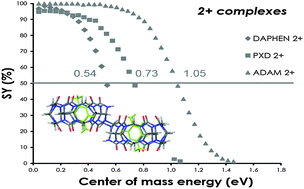Energy-resolved collision-induced dissociation of non-covalent ions: charge- and guest-dependence of decomplexation reaction efficiencies†
Abstract
Supramolecular chemistry, and especially host–guest chemistry, has been the subject of great interest in the past few decades leading to the synthesis of host cage molecules such as calixarenes, cyclodextrins and more recently cucurbiturils. Mass spectrometry methods are increasingly used to decipher at the molecular level the non-covalent interactions between the different associated molecules. The present article illustrates that the association between mass spectrometry and computational chemistry techniques proves very complementary to depict the gas-phase dissociation processes of ionic non-covalent complexes when subjected to collisional activation. The selected system associates a nor-seco-cucurbit[10]uril bitopic receptor with different amino compounds (adamantylamine, para-xylylenediamine, and para-phenylenediamine). When subjected to CID experiments, the ternary complexes undergo fragmentation via dissociation of non-covalently bound partners. Interestingly, depending on their charge state, the collisionally excited complexes can selectively expel either a neutral guest molecule or a protonated guest molecule. Moreover, based on energy-resolved CID experiments, it is possible to evaluate the guest molecule dependence on the gas phase dissociation efficiency. We observed that the relative order of gas phase dissociation is charge state dependent, with the adamantylamine-containing complexes being the weakest when triply charged and the strongest when doubly charged. The energetics of the gas-phase dissociation reactions have been estimated by density functional theory (DFT) calculations. We succeeded in theoretically rationalizing the experimental collision-induced dissociation results with a special emphasis on: (i) the charge state of the expelled guest molecule and (ii) the nature of the guest molecule.


 Please wait while we load your content...
Please wait while we load your content...